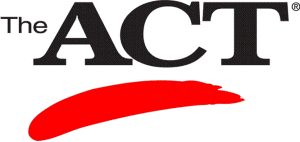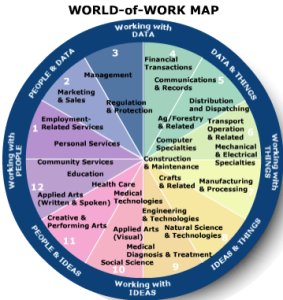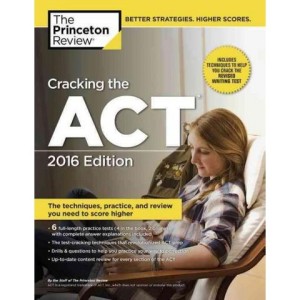Princeton Review Cracking the ACT 2016
Table of Contents
Junior year of high school, all my friends could talk about was planning for college and taking the SATs. I went along to try out a review class at one particular well-known prep center, and left the session with my head spinning. I couldn’t imagine sitting through this test.
Now, I’m a good student and get top grades, so the issue wasn’t apathy towards hard work or a lack of test-taking ability. Rather, the SAT just did not seem to be a good fit for me. I got my hands on a copy of Princeton Review Cracking the Act 2016 and started researching the ACT as an alternative to the SAT. As it turns out, I was far from the only student who’d ever had this dilemma.
Taking ACT as an Alternative to SAT Exam
The American College Testing (ACT) program was founded in 1959, to address shortcomings found with the SAT. While the SAT was designed to predict future academic success in college, the ACT functioned as an achievement test, measuring knowledge that students had previously learned. For that reason, many people to this very day find the ACT easier to study for.
The ACT and SAT each hold their own unique set of advantages, and different tests will be best suited for different students. For starters, the SAT tends to use more difficult vocabulary, which means that students might need to spend more time figuring out what the questions even mean before they can begin solving the actual problem. By contrast, questions on the ACT are more straightforward.
While the SAT measures students’ reasoning skills and vocabulary, the ACT focuses on achievement in the subjects of English, reading, writing, science and math. The SAT doesn’t have a science section at all, while the science section on the ACT asks for students to interpret information in the form of data and graphs. Unlike on the SAT, the ACT allows students to use a calculator for all math problems. If you are one of the many high schoolers who finds math to be one of your most challenging subjects, the ability to use a calculator will ease a lot of stress.
Neither test can be said to be more difficult than the other across the board; rather, since different students excel at different things, these two options exist so as to allow each individual to present him or herself in the best possible light.
Benefits of ACT Test over SATs
That said, many students find it less complicated to prepare for the ACT, since it is more closely related to what they have actually learned throughout their high school classes. Students who are naturally intelligent but don’t put in as much work as they should tend to favor the SAT, but for students who generally strive to achieve good grades, the ACT will likely reflect all of the hard work they have put in throughout the course of their studies.
Furthermore, the ACT serves a purpose beyond its universal acceptance as an admissions exam to all U.S. colleges – the test also includes a profile and education/career planning section to help students explore the options available to them upon their high school graduation.
It should be noted that the ACT does have significantly more time pressure than the SAT. You must be able to read and answer questions more quickly. Otherwise, the test taking itself is about the same amount of time for both exams. With the essay included, the ACT winds up being 20 minutes shorter than the SAT – not a significant amount of difference. However, if you choose to skip the ACT’s optional essay, the test winds up being almost an hour shorter than the SAT. That said, I highly recommend that you do not skip the essay – even though it isn’t required by the ACT board, many colleges will still require the essay, and even schools which don’t require it might look unfavorably upon applicants who opt to skip it.
Many colleges present students with two options: either take the SAT plus two subject tests (SAT II) or take the ACT. Personally, the opportunity to skip out on subject tests was reason enough alone to choose the ACT. Colleges also tend to look at each SAT sub-score individually (Reading, Writing, Math) whereas the ACT is usually measured based on a composite score averaged from all of the individual sub-scores.
At the end of the day, though, there is no one “better” test. The best option might be to take a practice test (or two) of each option, see whether you prefer the style of the ACT vs SAT, and then make your selection and plan your study schedule accordingly.
Princeton Review Cracking the ACT practice tests
The Cracking the ACT Princeton Review book is an essential tool for any student who wants to score higher. This review includes 6 full-length practice tests, enough to take one test every other week for 3 months. True, there are some students who prefer taking all of the practice tests closer to the time of their actual exam, after they’ve had more opportunity to study, but I personally chose to scatter my practice tests throughout the course of my studying so as not to overwhelm myself. The practice tests include explanations of each answer and go into full detail, allowing you to really learn from any mistake. Therefore, I was able to spend the time in between each practice test really understanding and focusing on where my problem areas lay, and studying accordingly.
Be aware that the practice tests in the 2016 edition are the same as the practice tests from the 2015 book. Therefore if you decide to purchase the latest edition, don’t bother looking for additional tests from last year’s book, since they are in fact the same ones. Also, of the 6 practice tests included, 4 of them are actual hard copies while the other 2 are available online. For the online test, you can receive an instant score report as well as optional LiveGrader essay scoring.
The tips and techniques offered by this review book are a great refresher for current high school students, as well as individuals who have already been out of school but are just now applying to college. This book reviews each of the five ACT sections – reading, writing, English, math, and science.
You’ve already put in so much effort, studying hard and getting good grades all throughout school. Make your ACT score count, and prepare accordingly so you can do your very best!




No comments yet.